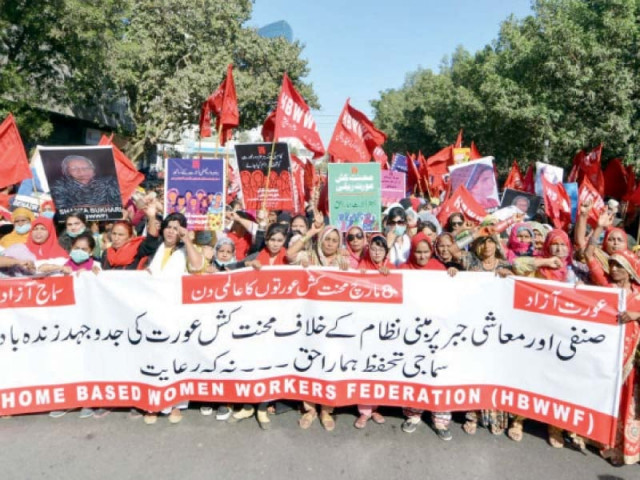Women workers — the reserve army of unorganised economies
Participants at Mehnatkash Aurat rally call for rights of women workers, present a charter of demands

The worst international manifestation of capitalism is unorganised economy, which is giving birth to new types of exploitation, and resultantly, women workers are being used as a 'reserve army' in the production process and are deprived of all their legal rights, lamented activists at the 'Mehnatkash Aurat' rally on Monday.
The rally, organised by the Home-Based Women Workers Federation (HBWWF), was addressed by HBWWF general secretary Zahra Khan, Nasir Mansoor of the National Trade Union Federation, Saira Feroze of the United Home-Based Garment Workers Union, Saeed Baloch of the Pakistan Fisherfolk Forum, Karamat Ali of the Pakistan Institute of Labour, Education and Research, Asad Iqbal Butt of the Human Rights Commission of Pakistan and other.
The speakers highlighted that in Pakistan too, women faced the repercussions of an unorganised economy.
They are deprived of their basic rights, including the right to unionise, collective bargaining, pensions, social security and equal wages, the speakers pointed out, adding that the worrisome scenario was not just prevalent in the industrial sector, but also in farms and fields, where hari and peasant women were compelled to live a life that was worse than slavery.
Besides, women in the country face joblessness, poverty, gender pay gap and sexual harassment at the workplace, they said. And when women raise their voice for their demands, industrialist shifts formal sectors to unorganised home-based work, they decried.
Demands
A set of demands to ensure that women workers in Pakistan were given their rights were also presented on the occasion.
The demands included the annullment of discriminatory laws against women, abolition of feudal and tribal systems, protection for women at workplaces, the establishment of vigilance committees against harassment as per the law, legislation to end the sexual harassment and forced conversions of hari women.
Also in the list were demands to end to support for extremism, ban on ideologies in support of war mongering and religious and sectarian hatred, shunning of International Monetary Fund and World Bank centric policies, land reforms and the distribution of state lands among landless hari families for free, registration of workers with social security institutions, end to gender pay gap, pay raises in proportion with inflation, increasing the duration of maternity leaves and limiting daily wage working hours to eight hours a day.
To end to forced work on weekly holidays, given women labourers working in garment factories for local and international brands their rights, end to contract-based employment and regularisation of contract workers, the implementation of labour laws, legislation for domestic workers' rights, acceptance of lady health workers' demands, establishment of childcare centres at workplaces, women being given representation in elected forums in the proportion of their population percentage, recovery of missing political and social workers and lifting the ban on media were also there.
Published in The Express Tribune, March 9th, 2021.



















COMMENTS
Comments are moderated and generally will be posted if they are on-topic and not abusive.
For more information, please see our Comments FAQ